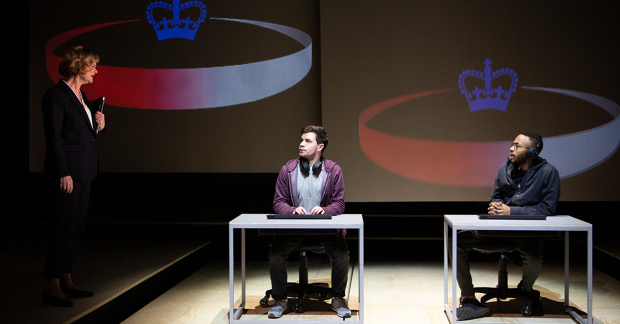Review: The Haystack (Hampstead Theatre)
Al Blyth’s world premiere production tells of an investigative journalist in a world monitored by GCHQ and national surveillance

© Ellie Kurttz
If you've nothing to hide then do you really have nothing to fear from extensive surveillance in the modern world? Is a lack of online privacy a fair price to pay for keeping the status quo safe?
These are just two of the questions at the heart of Al Blyth's timely, ambitious play, which marks this gifted, prize-winning writer's first professionally produced full-length piece as well as Roxana Silbert's first mainstage production since taking over as artistic director at Hampstead. The pair work extremely well together.
Billed as a thriller, the story is told in flashback: Neil (Oliver Johnstone), a former agent of the intelligence and security organisation GCHQ, spills his guilty guts to an initially sceptical then apparently sympathetic newspaper editor (an entirely convincing Lucy Black) following the disappearance of a journalist (Rona Morison, confirming once again that she is one of our most exciting, intelligent young actresses). What unfolds is a fascinating examination of how technology has overtaken what is legally allowable in terms of prying into the lives of others in the name of protecting the nation.
It's fiction but touches base with fact frequently enough to give pause for thought, and occasionally chills down the spine. The suspicious death of GCHQ employee Gareth Williams in 2010, found naked in an inexplicably padlocked bag, is referenced then given a theatrical moment that authentically shocks. This is meaty, compelling stuff, but it occasionally feels a bit overwhelmed by its own portentousness.
Blyth's dialogue is spiky, salty and very funny. His depiction of the nerdy brotherhood between Neil and his geeky work cohort Zef (Enyi Okoronkwo, hilarious then chilling as the extent of the breach of security is revealed) is a plausible delight: think The IT Crowd but with much more at stake. Sarah Woodward delivers magnificent work as the starchy but allegedly humane face of GCHQ.
The play falters though in the introduction of a romance between agent Neil and Cora, the missing journalist; here Blyth's writing starts to feel pedestrian and clichéd, although Johnstone and Morrison's sincerity and skill go some way to redeeming it. The scene where Neil – under an assumed identity – has engineered a meeting with Cora in a bar – she talks normally while he responds in a series of computer keyboard commands ("Up', "Left", "B", "A") – is inventive but a bit gimmicky, despite being convincingly delivered by the actors.
It's Johnstone that really drives the evening, and he is terrific, mining the role for all of its humour, eccentricity and, later on, considerable anguish. He possesses an innate likability plus an unconventional but entirely believable mixture of gravitas, nerdiness and athleticism.
Blyth is clearly a born storyteller, and the second half – when the 'thriller' element properly kicks in – includes some surprises that may strain credibility but undoubtedly make for exciting theatre. Short, staccato scenes and the use of moving flat screens, for projections and to indicate changing locations in Tom Piper's appropriately corporate-looking set design, ensure that The Haystack has such a pace and cinematic sweep that the near three-hour running time barely registers. Silbert's fast-moving staging blurs the boundaries between naturalistic movement and dance at times, which contributes to the slightly nightmarish effect.
Scenes cross cut, and bleed into, each other, reminiscent of Tony Kushner's work in Angels In America – a comparison furthered by the juxtaposition of slightly soap-operatic human interest and mind-bogglingly complex information. And while Blyth's work doesn't reach anywhere near the same heights of dramatic brilliance as that work, it certainly makes one impatient to see what the playwright comes up with next.
The Haystack – a metaphor for the great mass of humanity under constant surveillance while the powers-that-be search out the threats to society, the proverbial "needles" – may not be perfect, but it's undeniably gripping and gives plenty to reflect upon. I wrote this on a tablet, you may be reading it on a PC or a smartphone, and at some level this is probably being monitored. Thought-provoking, no?




















